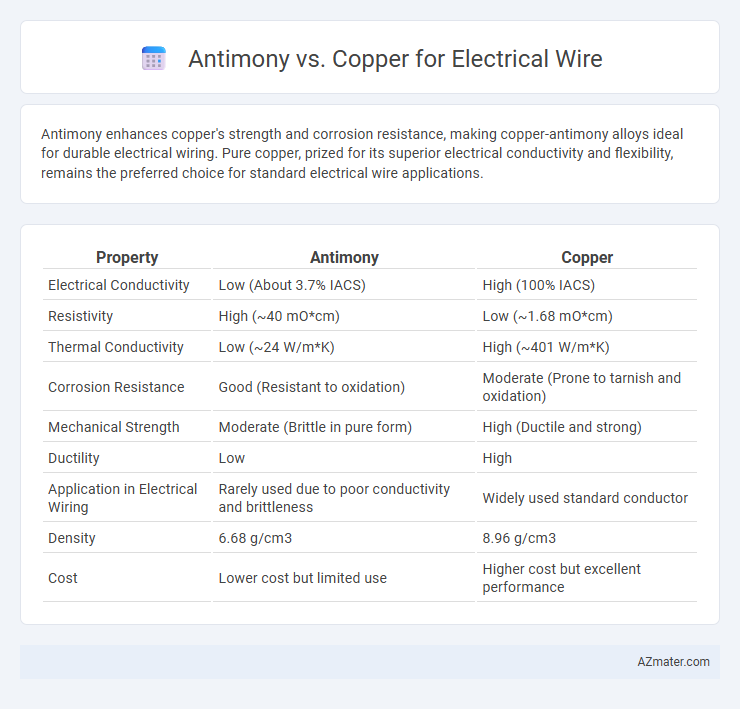Antimony enhances copper's strength and corrosion resistance, making copper-antimony alloys ideal for durable electrical wiring. Pure copper, prized for its superior electrical conductivity and flexibility, remains the preferred choice for standard electrical wire applications.
Table of Comparison
| Property | Antimony | Copper |
|---|---|---|
| Electrical Conductivity | Low (About 3.7% IACS) | High (100% IACS) |
| Resistivity | High (~40 mO*cm) | Low (~1.68 mO*cm) |
| Thermal Conductivity | Low (~24 W/m*K) | High (~401 W/m*K) |
| Corrosion Resistance | Good (Resistant to oxidation) | Moderate (Prone to tarnish and oxidation) |
| Mechanical Strength | Moderate (Brittle in pure form) | High (Ductile and strong) |
| Ductility | Low | High |
| Application in Electrical Wiring | Rarely used due to poor conductivity and brittleness | Widely used standard conductor |
| Density | 6.68 g/cm3 | 8.96 g/cm3 |
| Cost | Lower cost but limited use | Higher cost but excellent performance |
Introduction to Antimony and Copper in Electrical Wiring
Antimony is a metalloid known for its hardness and corrosion resistance, often used as an alloying element to improve the mechanical properties of metals like lead and copper. Copper, a highly conductive metal, remains the industry standard for electrical wiring due to its excellent electrical conductivity and malleability. While copper provides superior electrical performance, antimony alloys enhance durability and resistance to wear in specialized wiring applications.
Chemical and Physical Properties Comparison
Antimony exhibits greater hardness and brittleness compared to copper, making copper more suitable for electrical wiring due to its excellent ductility and flexibility. Copper's superior electrical conductivity, approximately 5.96 x 10^7 S/m, vastly outperforms antimony, enhancing energy efficiency and signal transmission. Chemically, copper is more resistant to corrosion and oxidation in typical electrical environments, whereas antimony's susceptibility limits its practical use in electrical wire applications.
Electrical Conductivity: Antimony vs Copper
Copper exhibits significantly higher electrical conductivity, approximately 5.96 x 10^7 S/m at room temperature, compared to antimony's much lower conductivity of about 2.5 x 10^5 S/m. This difference makes copper the preferred choice for electrical wiring due to its superior ability to efficiently transmit electrical current with minimal resistive losses. Antimony's limited conductivity restricts its use to alloying and semiconductor applications rather than direct electrical wiring.
Corrosion Resistance and Longevity
Copper demonstrates superior corrosion resistance compared to antimony, ensuring electrical wires maintain conductivity and structural integrity over extended periods. Antimony, often alloyed in small amounts with other metals, provides limited enhancement to corrosion resistance but does not match copper's inherent durability in harsh environments. Copper's longevity in electrical wiring applications is well-documented due to its resilience against oxidation and environmental degradation, making it the preferred choice for reliable, long-term use.
Mechanical Strength and Flexibility
Copper exhibits superior mechanical strength and flexibility compared to antimony, making it the preferred material for electrical wiring. Antimony, often used as an alloying element, improves hardness and tensile strength in metals but does not match copper's ductility essential for wire bending and installation. Copper's optimal balance of tensile strength and elasticity ensures durability and resilience in electrical applications, whereas antimony-enhanced materials tend to be more brittle.
Cost Analysis: Antimony vs Copper Wires
Antimony wire typically incurs higher material costs compared to copper due to its rarity and complex extraction process, making it less cost-effective for large-scale electrical wiring. Copper wire remains the industry standard because of its excellent conductivity and lower price per unit weight, offering better cost efficiency for most electrical applications. When factoring in longevity and performance, copper wires provide a more economically viable solution over the lifecycle of electrical installations.
Environmental Impact and Sustainability
Copper's widespread use in electrical wiring is due to its excellent conductivity and recyclability, making it a sustainable choice with a well-established recycling infrastructure that reduces environmental impact. Antimony, often used as a flame retardant additive in cable sheathing, poses greater environmental concerns due to its toxicity and limited recycling options, which can lead to soil and water contamination. Choosing copper over antimony-infused materials supports a lower ecological footprint and enhances the sustainability of electrical wiring systems.
Safety Considerations and Toxicity
Antimony, often used as an alloying element in electrical wire, poses significant toxicity risks, including respiratory and skin irritation, requiring strict handling precautions to prevent exposure. Copper, widely preferred due to its excellent electrical conductivity and lower toxicity, offers enhanced safety with minimal health hazards during installation and use. Safety considerations favor copper wiring in residential and commercial applications to reduce potential toxic exposure and ensure long-term reliability.
Common Applications and Industry Use Cases
Copper is the preferred material for electrical wiring due to its excellent electrical conductivity, durability, and corrosion resistance, making it ideal for residential, commercial, and industrial power distribution systems. Antimony is rarely used on its own in electrical wiring but is often added as an alloying element to lead or tin to enhance hardness and mechanical strength in cable sheathing and connectors within specialized industrial applications. The electrical industry favors copper for wiring infrastructure while employing antimony-containing alloys in component manufacturing to improve performance and longevity in harsh environments.
Conclusion: Which is Better for Electrical Wiring?
Copper outperforms antimony in electrical wiring due to its superior electrical conductivity, corrosion resistance, and mechanical flexibility. While antimony is typically used as an alloying element to enhance the strength of metals, it lacks the ductility and conductivity necessary for efficient power transmission. Therefore, copper remains the preferred choice for electrical wiring in residential, commercial, and industrial applications.

Infographic: Antimony vs Copper for Electrical Wire
 azmater.com
azmater.com